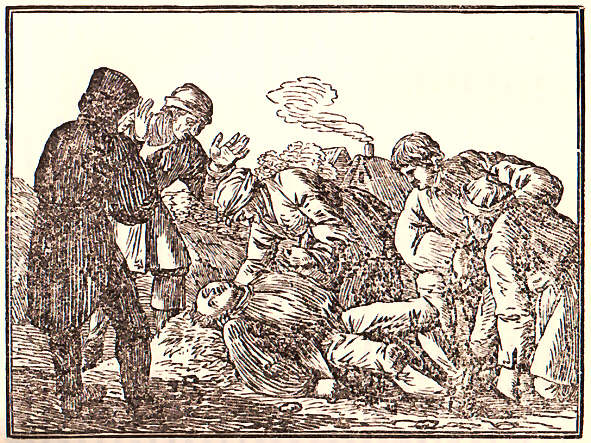|
|
|
||
|
Johann Peter Hebel Unexpected Reunion / Unverhofftes Wiedersehen (1811) (Translation into English) In Falun in Sweden, a good fifty years ago and more, a young miner kissed his beautiful young bride and said to her: ‘At St Lucy's our love will be blessed by the priest's hand. Then we will be man and wife and build our own little nest.’ - ‘And peace and love shall dwell in it,’ said the beautiful bride with a charming smile, ‘for you are my one and only, and without you I would rather be in the grave than in any other place.’ But when the priest had called out to her for the second time in the church before St Lucy's Day: "If anyone would know to indicate an obstacle why these persons should not come together in marriage” ’ - then death made itself known. For when the young man walked past her house the next morning in his black miner's clothes - the miner always wears his death dress - he knocked on her window once more and said good morning, but no more good evening. He never came back from the mine, and she hemmed a black scarf with a red border for him that morning in vain for his wedding day, but when he never came, she put it away and wept for him and never forgot him. Meanwhile, the city of Lisbon in Portugal was destroyed by an earthquake, and the Seven Years' War was over, and Emperor Francis the First died, and the Jesuit Order was abolished, and Poland was divided, and the Empress Maria Theresa died, and Struensee was executed, America became free, and the combined French and Spanish power could not conquer Gibraltar. The Turks imprisoned General Stein in the Veteran Cave in Hungary, and Emperor Joseph also died. King Gustav of Sweden conquered Russian Finland, and the French Revolution and the Long War began, and Emperor Leopold the Second also went to his grave. Napoleon conquered Prussia, and the English bombed Copenhagen, and the farmers sowed and reaped. The miller milled, and the blacksmiths hammered, and the miners dug for the metal loaders in their underground workshop. But when the miners in Falun wanted to dig an opening between two shafts a little before or after St. John's Day in 1809, they dug out the body of a young man from the rubble and vitriol water, who was completely permeated with iron vitriol, but otherwise undecayed and unchanged; so that his facial features and his age could still be fully recognised, as if he had died an hour ago, or had fallen asleep a little while at work. But when he had been carried out to day, father and mother, friends and acquaintances had long been dead, no one wanted to know the sleeping youth or anything about his misfortune, until the miner's former fiancée came, who had gone out on shift one day and never returned. Grey and shrunken, she came to the place on a crutch and recognised her bridegroom; and more with joyful delight than with pain she sank down on the beloved corpse, and only when she had recovered from a long violent movement of the mind, ‘It is my betrothed,’ she said at last, ‘for whom I had mourned for fifty years, and whom God will let me see once more before my end. Eight days before the wedding he went into the ground and never came up.’  Then the minds of all the bystanders were seized with melancholy and tears as they saw the former bride now in the form of her withered, feeble old age and the bridegroom still in his youthful beauty, and how the flame of youthful love awoke once more in her breast after 50 years; but he never opened his mouth to smile or his eyes to recognise her; and how she finally let the miners carry him to her little room, as the only one who belonged to him and had a right to him until his grave was prepared in the churchyard. The next day, when the grave was prepared in the churchyard and the miners came for him, she unlocked a little box, put the black silk scarf with red stripes round his neck, and then accompanied him in her Sunday robe, as if it were her wedding day and not the day of his burial. For when they laid him in his grave in the churchyard, she said, ‘Sleep well now, another day or ten in the cool wedding bed, and don't let the time grow long. I have but little more to do, and will soon come, and soon it will be day again. - What the earth has given back once, it will not keep a second time,’ she said, as she went away, and looked round once more.
|
|||
|
Variations
of a
Story: A
Narrative and
Literary Comparison
|
|||
|
by Val Scullion (PhD), Independent scholar, Buckden, United Kingdom |
|||
|
zurück |